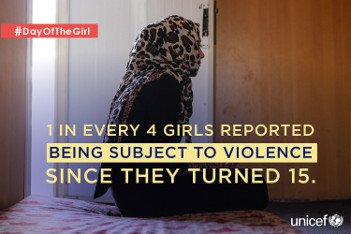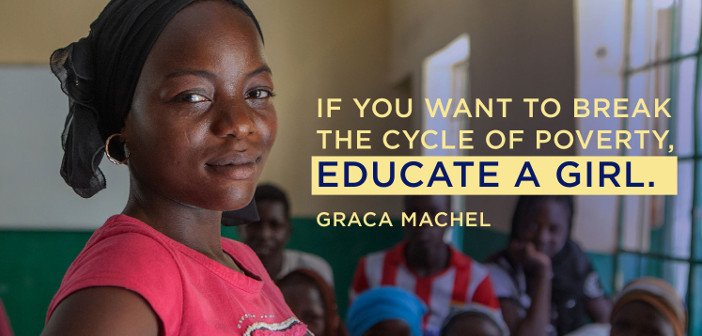International Day of the Girl
Since 2013, UNICEF has celebrated International Day of the Girl Child (or Day of the Girl) to emphasise the gender based issues faced by young girls, and to promote global gender equality. This year, October 11th saw the Children’s Fund focus on the girls of the future with the theme ‘The Power of the Adolescent Girl: Vision for 2030.’ According to the organisation, this generation of girls is the largest to have ever been recorded, with almost 600 million girls between the ages of 10 and 19 living around the world today. UNICEF’s goal is to ensure that their worth is acknowledged, that they are safe from violence and harm, and that each and every one of them recognises their limitless potential.
[pullquote]The programme is predominantly aimed to ensure that by 2030, the largest generation of girls have grown up with the same opportunities as the largest generation of boys.[/pullquote]
Through the running of workshops, hosting of seminars, and giving of speeches, this years Day of the Girl promoted the necessary inclusion and integration of all young women into education, and called for the end of female genital mutilation (FGM) and other forms of sexual violence such as rape and forced child marriages. The programme is predominantly aimed to ensure that by 2030, the largest generation of girls have grown up with the same opportunities as the largest generation of boys.
UN Secretary General Ban Ki-Moon stated that successfully achieving this progression in gender equality will lead to successes across all of society. In a statement issued on UNICEF’s website, he said:
Let us resolve to invest in today’s adolescent girls so that tomorrow they can stand strong as citizens, political leaders, entrepreneurs, heads of their households and more. This will secure their rights and our common future.

Michelle Obama even got in on the action by releasing her first ever Spotify playlist in honour of the day. It included ‘No Scrubs’ by TLC, Aretha Franklin’s ‘Respect,’ and of course, some Beyoncé. She also launched her own online campaign alongside the Peace Corps called Let Girls Learn. Using the hashtag #62MillionGirls, the First Lady took to Twitter and Instagram to spread awareness about the 62 million young women who are currently being denied education around the world today. She encouraged people all over the internet to pledge their support in the form of a ‘yearbook’ photo, a donation, or even volunteering to lead community change at grassroots level. With Obama, were UNICEF, Girl Up, Girls Not Brides, and countless other organisations sharing factographs, their own hashtags, and information about how to get involved.
According to Dr. Tilly Gurman, ‘hashtag activism’ actually achieves more than just the creation of a trending topic. She says that “The more we hear about a topic, the more primed we are in thinking that it’s an important topic.” While this may seem obvious, it’s not unfair to say that a worldwide campaign like Day of the Girl probably wouldn’t exist if it wasn’t for the internet – and if it did, it certainly would not have gained as much traction as it did with the likes of Twitter and Facebook.[pullquote] “The more we hear about a topic, the more primed we are in thinking that it’s an important topic.” – Dr. Tilly Gurman [/pullquote]
But sending numerous tweets, pledging solidarity, and making factographs weren’t all that the Day of the Girl campaigners did to dismantle the Western led myth of postfeminism. They exposed the challenges faced by young women – particularly in non-Western countries – and showcased just what they had been doing to promote and secure the equality of these girls.
In Malawi, it is customary for many girls to marry before their eighteenth birthday. Not only do lots of these girls face gender-based violence and discrimination because of this, but the majority are also forced to drop out of school due to their duties as a wife, or because they have become pregnant. According to UN Women, Malawi does have equal numbers of boys and girls in education in lower grades, but eventually these numbers begin to dwindle, leaving only 45% of girls in school after 8th grade.
Earlier this year, Malawi Senior Chief Inkosi Kachindamoto lobbied to annul the marriages of over 300 young men and women, who had been customarily wed before the country’s introduction of the Marriage, Divorce, and Family Relations Act – an act which raised the legal age of marriage to 18, but did not affect those already married. Chief Kachindamoto emphasised the importance of allowing these children to return to school, and stated that even though she was met with resistance by a number of village heads, she was adamant to make this change within Malawian society.
Chief Kachindamoto may be a traditional leader, but she also recognises the injustices associated with child marriages for all genders, and has made it her duty to educate parents and village heads about the necessity of healthy childhoods. “I talk to the parents. I tell them: if you educate your girls you will have everything in the future.” [pullquote]“I talk to the parents. I tell them: if you educate your girls you will have everything in the future.” – Chief Kachindamoto[/pullquote]
Chief Kachindamoto isn’t the only human rights advocate being met with the resistance of cultural practices and traditional values. Female genital mutilation, or FGM, is another one of UNICEF’s main concerns considering the welfare of young girls around the world. The practice – which is most common in 27 African countries, but also carried out in Asia, Yemen, and the Middle East – typically involves the cutting and removal of the clitoral glans and hood; though, in some cases the entire labia can be removed and the vulva closed. The process is carried out to incite social acceptance within communities, and to increase social standing and male sexual pleasure.
The age at which girls experience FGM varies enormously, but according to national surveys most girls are cut shortly after their birth (although this is the opposite for places like Egypt and the Central African Republic, where over 80% of girls are cut between the ages of 5 and 18).
 UNICEF have not only expressed concern for the severe physical and psychological risks associated with FGM, but have also linked the custom with the control of women’s sexuality, and deemed it a stark violation of human rights that has no health benefits whatsoever. Just this year, the organisation applauded the decision of Nigerian president Goodluck Jonathan to outlaw the procedure as one of his final acts of leadership. Although Nigeria is the latest of several African countries to ban FGM, it is widely believed that many places have enforced these laws poorly, and that thousands of women are still experiencing the chronic pain of this age old custom.
UNICEF have not only expressed concern for the severe physical and psychological risks associated with FGM, but have also linked the custom with the control of women’s sexuality, and deemed it a stark violation of human rights that has no health benefits whatsoever. Just this year, the organisation applauded the decision of Nigerian president Goodluck Jonathan to outlaw the procedure as one of his final acts of leadership. Although Nigeria is the latest of several African countries to ban FGM, it is widely believed that many places have enforced these laws poorly, and that thousands of women are still experiencing the chronic pain of this age old custom.
However, the lobbying and direct involvement of organisations like UNICEF has been met with criticism by many anthropologists and feminist theorists. Obioma Nnaemeka – who is strictly opposed to FGM – has commented on the West’s involvement in the criminalisation of FGM, and in particular, its renaming from what it was originally known as – female circumcision. She says that although the procedure is a violation of human rights, many Westerners treat its banning as a civilising mission, or another chance to culturally colonise the Other. In turn, those lobbying against the custom have condemned this opposition as a failure of the millions of women who have been affected, and the millions more who probably will still be.
Although there has been a drastic decline in FGM over the past 30 years, it is believed that the number of women experiencing it will actually have risen by 2050 due to population growth. It is for this reason that Day of the Girl has become such an important venture. This generation of girls is the largest the world has ever seen, and so, it is vital to ensure that each and every one of them recognises their worth, and remains free from gendered violence. There may be a lot more girls to protect, but there are also a lot more girls to change the world.
Images via unicef.com
telegraph.co.uk

